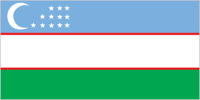Compare
Falkland Islands
to
Uzbekistanto
UzbekistanThe GDP per capita in Uzbekistan is $3,800 while in Falkland Islands it is $55,400
This entry shows GDP on a purchasing power parity basis divided by population as of 1 July for the same year. A nation's GDP at purchasing power parity (PPP) exchange rates is the sum value of all goods and services produced in the country valued at prices prevailing in the United States. This is the measure most economists prefer when looking at per-capita welfare and when comparing living conditions or use of resources across countries. The measure is difficult to compute, as a US dollar value has to be assigned to all goods and services in the country regardless of whether these goods and services have a direct equivalent in the United States (for example, the value of an ox-cart or non-US military equipment); as a result, PPP estimates for some countries are based on a small and sometimes different set of goods and services. In addition, many countries do not formally participate in the World Bank's PPP project that calculates these measures, so the resulting GDP estimates for these countries may lack precision. For many developing countries, PPP-based GDP measures are multiples of the official exchange rate (OER) measure. The differences between the OER- and PPP-denominated GDP values for most of the wealthy industrialized countries are generally much smaller.
Source:
CIA World Factbook
Uzbekistan has an unemployment rate of 4.80% while Falkland Islands has 4.10%
This entry contains the percent of the labor force that is without jobs.
Source:
CIA World Factbook
Falkland Islands consumes 4.4352 gallons of oil per day per capita while Uzbekistan consumes 0.1974
This entry is the total oil consumed in gallons per day (gal/day) divided by the population. The discrepancy between the amount of oil produced and/or imported and the amount consumed and/or exported is due to the omission of stock changes, refinery gains, and other complicating factors.
Source:
CIA World Factbook
The per capita consumption of electricity in Falkland Islands is 6,221kWh while in Uzbekistan it is 1,538kWh
This entry consists of total electricity generated annually plus imports and minus exports, expressed in kilowatt-hours. The discrepancy between the amount of electricity generated and/or imported and the amount consumed and/or exported is accounted for as loss in transmission and distribution.
Source:
CIA World Factbook
 With its 28,929,716 people, Uzbekistan is the
44th largest country in the world by
population. It is the 57th largest country in the
world by area with 447,400 square kilometers.
With its 28,929,716 people, Uzbekistan is the
44th largest country in the world by
population. It is the 57th largest country in the
world by area with 447,400 square kilometers.
Russia conquered the territory of present-day Uzbekistan in the late 19th century. Stiff resistance to the Red Army after the Bolshevik Revolution was eventually suppressed and a socialist republic established in 1924. During the Soviet era, intensive production of "white gold" (cotton) and grain led to overuse of agrochemicals and the depletion of water supplies, which have left the land degraded and the Aral Sea and certain rivers half dry. Independent since 1991, the country has lessened its dependence on the cotton monoculture by diversifying agricultural production while developing its mineral and petroleum export capacity and increasing its manufacturing base. However, longserving septuagenarian President Islom KARIMOV, who rose through the ranks of the Soviet-era State Planning Committee (Gosplan), remains wedded to the concepts of a command economy, creating a challenging environment for foreign investment. Current concerns include post-KARIMOV succession, terrorism by Islamic militants, economic stagnation, and the curtailment of human rights and democratization.
Check out the recommended reading list below for great sources of information on Uzbekistan